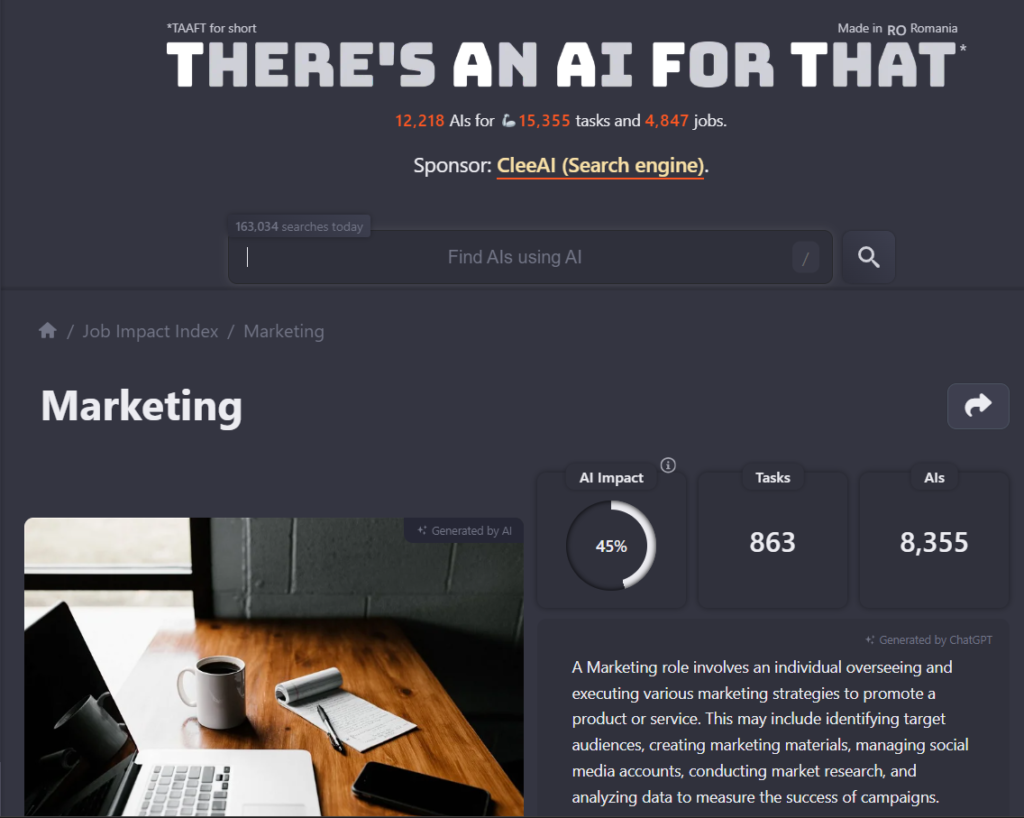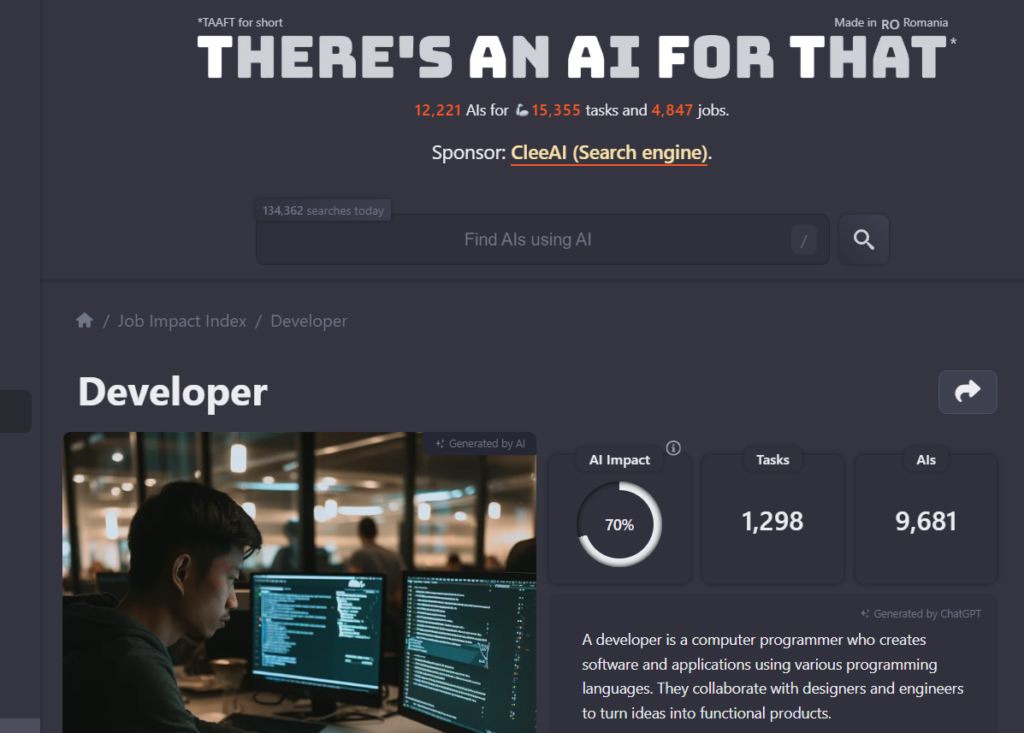The marketing landscape is undergoing a revolution driven by artificial intelligence (AI). It’s no longer science fiction; it’s real. And the impact of AI on marketing is enormous.
There’s no need for many human colleagues to handle tasks; now, agencies can use automation tools and platforms. These can handle the same tasks way better and faster than humans, and this is a fact.
AI Impact on Marketing in 2024
AI rapidly transforms how brands connect with customers, optimize campaigns, and personalize the user experience.
The profound impact of AI on marketing is visible in the rise of generative engine optimization, the power of AI writing tools, and the multifaceted world of AI optimization.
Generative Engine Optimization: The Future of SEO
Whereas SEO optimizes websites for traditional search engines like Google and Bing, GEO focuses on optimizing content for these AI-driven generative engines. In other words, while SEO is creating and optimizing content primarily to be ranked higher in SERPs, GEO is about creating and optimizing your content for the generative engines to pick you up as a source in their answers. By mentioning your brand as a source, chances are the generative engines also take your content, at least partially, and include it in the answers to queries.
Here’s a breakdown of the key differences:
- Target Audience: SEO plays to the strengths of traditional search engines, aiming for high rankings on SERPs. Conversely, GEO optimizes content for generative engines that are still developing but hold immense potential.
- Content Strategy: The SEO playbook involves strategic keyword placement and building backlinks. While these elements might still hold weight in GEO, the emphasis shifts towards providing well-structured, informative content that caters to the specific needs of AI engines.
- Focus: SEO strives to get your website on the first page of search results. GEO aspires to ensure generative engines use your content to craft informative answers for user queries.
Recently, TUYA Digital has taken an enormous leap and became Europe’s first GEO – Generative Engine Optimization agency.
Traditionally, marketers have relied on human creativity to craft compelling content. However, the emergence of generative engines powered by AI is rewriting the rules. These engines can generate various content formats, from product descriptions and social media posts to email newsletters and even blog articles.
This presents a paradigm shift:
- Content at Scale: AI can churn out high-quality content at an unprecedented pace, allowing marketers to maintain an active presence across multiple channels.
- A/B Testing on Steroids: Generative engines can produce numerous variations of content, enabling marketers to A/B test with a far greater precision and uncover the messaging that resonates most effectively.
- Personalized Content Creation: AI can analyze user data and tailor content to specific audience segments, ensuring maximum relevance and engagement.
However, generative engine optimization (GEO) is a developing field. Marketers must ensure AI-generated content adheres to brand voice and messaging while remaining factually accurate and emotionally engaging.
AI Writing Tools
AI writing tools are another potent weapon in the modern marketer’s arsenal. These tools go beyond simple content generation, offering features like:
- Idea Generation: Overcome writer’s block with AI-powered brainstorming tools that suggest topics, headlines, and content angles.
- Style and Tone Optimization: Fine-tune the voice and style of your content to resonate with your target audience.
- Grammar and Readability Enhancement: Ensure your writing is error-free, clear, and concise, leaving a professional impression.
We also wrote how to write like a human and avoid AI detection for ChatGPT. It comes in handy for anyone trying to write in a human-like style, not only for hiding that the AI tools created the content but primarily for that content to appeal to humans, to be readable and enjoyable.
AI writing tools empower marketers to become more efficient content creators but should not replace human creativity entirely. The most effective approach leverages AI for assistance while retaining a human touch in content development.
The All-Encompassing Power of AI Optimization
SEO done with AI is way better than SEO done exclusively by humans. We don’t say that SEO experts are not better than machines, but they use AI in their optimization process.
AI SEO, or Artificial Intelligence SEO, is a term that refers to the use of artificial intelligence technology in optimizing websites for search engines. AI SEO leverages machine learning algorithms and natural language processing to improve a website’s visibility, drive more organic traffic, and boost its overall performance.
Traditional SEO techniques involve manual analysis, keyword research, content optimization, and link building. While these methods are still important, AI SEO uses advanced algorithms to automate and streamline the process.
And no, there is no such thing as replacing the SEO specialist with AI. The SEO specialist uses AI to improve accuracy, speed, and data analysis volume, which benefits SEO clients.
One of the key benefits of AI SEO is its ability to analyze vast amounts of data quickly and accurately. Search engines like Google use hundreds of ranking factors to determine search rankings, and staying on top of these factors manually can be time-consuming and challenging. With AI SEO, machine learning algorithms can analyze and interpret these ranking factors, allowing marketers to make data-driven decisions in their optimization efforts.
AI SEO also helps identify patterns and trends in user behaviour, allowing marketers to tailor their content and strategies accordingly. By understanding user intent and preferences, businesses can create more relevant and engaging content that resonates with their target audience.
AI optimization extends far beyond content creation. Marketers can leverage AI for:
- Campaign Optimization: AI analyzes vast datasets to identify the most effective marketing channels, budget allocations, and campaign strategies in real time.
- Ad Targeting Optimization: AI algorithms can pinpoint ideal customer profiles, allowing for highly targeted advertising campaigns with an exceptional return on investment (ROI).
- Dynamic Pricing Optimization: AI can adjust pricing strategies in real-time based on market trends and customer behaviour, maximizing revenue and profitability.
The impact of AI optimization is undeniable. Marketers can confidently make data-driven decisions, leading to more effective campaigns, improved customer experiences, and significant business growth.
The Human Element: The Indispensable Ingredient
While AI is undoubtedly transforming marketing, it’s crucial to remember that AI is a tool, not a replacement for human marketers. The human touch remains essential for:
- Strategic Direction: AI excels at execution, but humans provide the strategic vision and define the overall marketing goals.
- Creative Storytelling: AI can craft content, but true brand storytelling requires a human understanding of emotions, values, and cultural nuances.
- Building Relationships: Marketing is about forging connections, and human empathy is irreplaceable in building customer trust and loyalty.
The Future of Marketing: A Human-AI Symbiosis
There is a platform which deserves to be followed. It presents almost all the AI-powered platforms that appear on the market. It is called There’s an AI for That.
If you are curious about checking it, you’ll see that whatever AI tool you might think of to help you with your tasks, whether it’s in marketing or automation, there’s an AI platform for that.
Most of them are in their early stages of development, but some do what they promise.
One exciting feature of this platform is that it calculates the impact of AI on marketing and other jobs. While we still need to understand the algorithm, we don’t doubt that the platform developers did their homework and set up a solid algorithm behind it.
So, things look like that – do you dream of becoming a marketing specialist in the future? It might come in handy that the impact of AI on your job is 45% at present.

Or maybe you dream of becoming a developer. In this case, you will be amazed to find out that the impact of AI on the jobs that initially developed AI is significant: 70%.

We, humans, are being replaced. Some call it “help,” they refer to the process as “AI is helping humans.”
The truth is that AI replaces employees while helping entrepreneurs. There is no need for ten employees when your hard work in marketing or any other field is done by one single RPA platform based on AI. AI takes no vacation and no lunch breaks. It doesn’t celebrate Easter or Christmas or postpone tasks for some other time when it feels creative or when its headache passes.
I definitely prefer working with AI when it comes to SEO & GEO Optimization, but I still need to have expert human handlers of AI platforms. Even this need will fade in time.
Dreaming of a four-day week? Keep up your hope! Soon, there will be a zero-day week for 60-70% of all employees working in digital-related industries.
ADAM C., AI Digital Strategist
Marketing agencies don’t need so many juniors any longer. There’s an AI for that. There are perfect AI platforms for writing optimized content, creating beautifully crafted visuals, editing videos, turning landscape video recordings into vertical reels, doing voice-overs, analyzing keyword optimization opportunities, and reporting to clients while automatically invoicing. The human intervention is so tiny that AI will do marketing shortly.
You will not need to hire humans when you have all these magnificent tools. It’s a fact. Why waste money on salaries and taxes when you can invest in technology and development?
The future of marketing lies in a powerful collaboration between human ingenuity and AI’s analytical prowess. By embracing AI tools and fostering a human-AI symbiosis, marketers can achieve unprecedented personalization, campaign effectiveness, and customer engagement. This future promises a marketing landscape that is not only data-driven but also deeply human-centric.
As AI continues to evolve, the possibilities for marketing are genuinely limitless. The marketing metamorphosis is upon us, and those who embrace AI will be the ones to thrive in the years to come.

